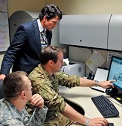INSCOM article provides inside look at a US-UK military personnel exchange program

exchange program
Members of the U.S. Army Intelligence and Security Command (INSCOM) are doing their part to strengthen relationships and improve interoperability with partner nations, thanks to initiatives like the Military Personnel Exchange Program at the National Ground Intelligence Center in Charlottesville, VA, writes Rita McIntosh, of INSCOM.
Just as importantly, those participating in the MPEP initiative also gain an in-depth understanding of how to work in the intelligence community at all levels, from strategic to tactical, says McIntosh in an article posted on the INSCOM Web site.
“Participation in the MPEP gives me a unique perspective on integration and better enables me to identify areas where we can corporately maximize our collaborative efforts,” said Maj. Michael E. Pepper, a British exchange officer. “Whether British or American, exchange programs provide foreign officers the opportunity to explore other military cultures and see that our differences only serve to unite us.”
The MPEP, a Department of the Army program, was implemented between the United Kingdom and the United States in 1962, by the Foreign Science and Technology Center, a predecessor to the NGIC [National Ground Intelligence Center]. The program provides unique opportunities for British and American officers to strengthen alliances and build coalition partnerships.
“The United Kingdom is one of our closest allies in defending the nation’s homeland and a great asset to the intelligence community,” said Jose Rodriguez, MPEP coordinator for NGIC. “Our countries are closely linked socially, culturally and economically, and all of us share a common interest to defend our freedoms.”
The MPEP involves a one-for-one exchange of personnel that takes place between the U.S. and partner nation armies. Typically, the individual is integrated in the host-nation’s military in positions commensurate with their grade and qualifications. As with stateside assignments, tours of duty range from one to two years.
Those involved with the program believe having exchange officers interact with U.S. personnel in the intelligence community promotes a collaborative, integrated culture and builds a cohesive team.
“Initiatives like the MPEP strengthen alliances and build partnerships,” Rodriguez added. “These programs improve how we as an intelligence agency work in conjunction with other governmental agencies across the intelligence community.”
The NGIC continues to seek ways to enhance the integration of the MPEP personnel, according to Elmo Wright, NGIC’s senior general military intelligence advisor.
“We recently gained the informal commitments of the U.S. and U.K. intelligence leaders to continue this partnership,” Wright said. “Despite the additional burden on security and information technology, this exchange program with the U.K. has proved more beneficial than simply requesting additional U.S. military personnel to fill positions.”
The duties of the MPEP personnel are coordinated through each country’s chain of command. In the history of the MPEP at NGIC, some of the British officers assigned to the unit have, with the concurrence of the UK, deployed to Iraq and Afghanistan on behalf of the NGIC.
Likewise, U.S. officers assigned in the UK have represented the UK position at bilateral and multi-lateral intelligence conferences, where sometimes the UK position was at variance with the U.S. position.
Chief Warrant Officer 4 Christopher Raiti is the MPEP officer serving with the UK Ministry of Defence in the Defence Intelligence, Capabilities and Assessment Land Office, and has seen first-hand the intelligence-sharing challenges and benefits of working with a much smaller force.
“Her Majesty’s Forces, to include the Royal Navy, Marines, Air Force and British Army combined, are only slightly larger than the U.S. Marine Corps,” Raiti noted. “Because of the size difference, UK forces must operate by a different model than that of the U.S. Army. While not all UK tactics would work for the U.S., leaders in the U.S. Army could learn a lot from how Her Majesty’s Forces do more with less.”
Aside from the fact that Raiti keeps his computer spell checker set to British for country-specific words, he said it only took him a couple of months in country before he was able to fully follow an entire conversation at the weekly team meetings.
“We joke that we are divided by a common language, and it’s true,” Raiti said. “The British service members and civilian team have made me feel very welcomed. They were quick to adopt me into the training program where I was able to get a jump start on my understanding of protocol, health, safety and security procedures here.”
Raiti echoed the sentiment of his UK counterpart in that the MPEP is a great way for officers to expand their understanding of working with other countries.
“I look forward to sharing my lessons learned with others and using that knowledge to assure a comprehensive working model between UK and other nations,” Raiti said, according to McIntosh’s INSCOM article, which was published last month.







